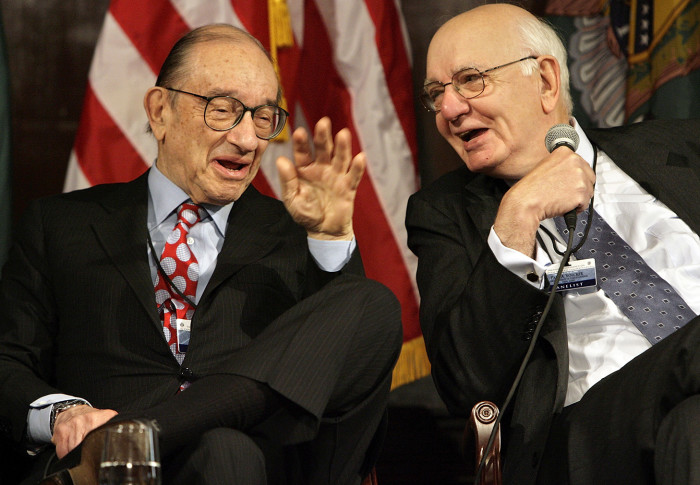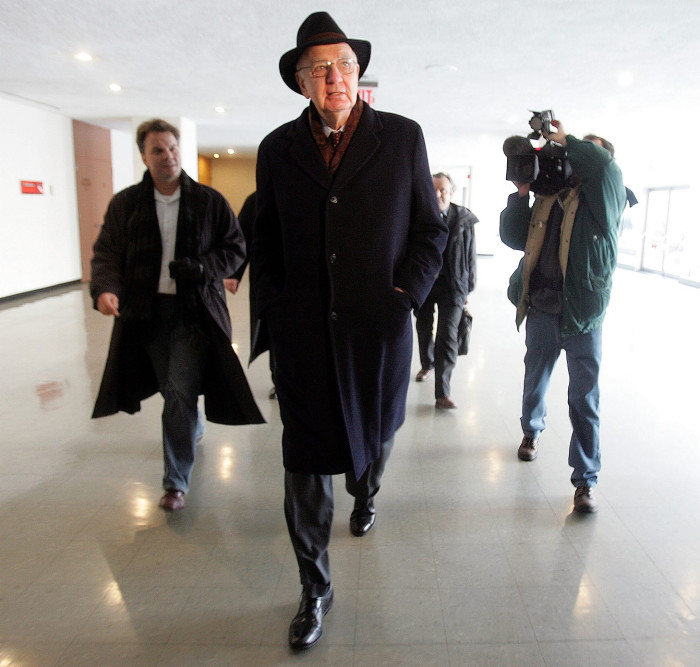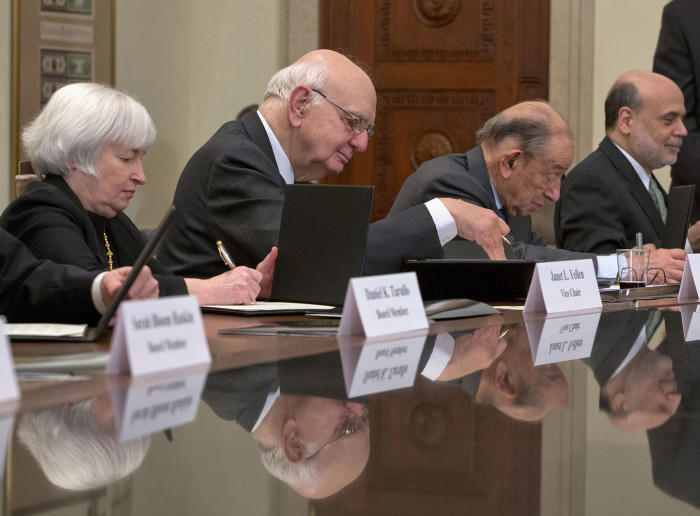
Paul Volcker, central banker, 1927-2019
Success at the Federal Reserve laid the groundwork for anti-inflation policies around the world
by Lionel Barber, Sam Fleming, David LascellesPaul Volcker, the Federal Reserve board chairman who vanquished the scourge of inflation that ravaged America’s prestige and power in the 1970s and early 1980s, has died at the age of 92.
A dedicated public servant and a towering figure in every sense — he stood 6ft 7in tall — Volcker served under presidents from John F Kennedy to Barack Obama. Throughout a career spanning more than six decades, his reputation for probity and dogged policymaking remained intact in the face of political storms.
Volcker came to epitomise the power of the independent central banker well before the phenomenon became fashionable under his successor Alan Greenspan. But he never lost his humility, regularly smoking cheap cheroots and travelling coach class on the shuttle from New York to Washington.
It was his steely resolve in the battle against inflation, in the most testing of political circumstances, which made him one of the most successful central bank governors in history, earning his place the hard way in the pantheon of American statesmen.
Jay Powell, the current Fed chairman, said in a statement that he was deeply saddened by Volcker’s death: “He believed there was no higher calling than public service. His life exemplified the highest ideals — integrity, courage, and a commitment to do what was best for all Americans. His contributions to the nation left a lasting legacy.”
Volcker rose to the challenge soon after his nomination to be Fed chairman by Jimmy Carter in 1979. His task was daunting: how to arrest the Great Inflation pushing price growth towards double-digit levels and pressuring the dollar on foreign exchange markets.

His arrival on the Fed’s board in August 1979 came as the US faced an economic crisis at home but also a crisis of leadership abroad after being humiliated by revolutionary Iran’s seizure of the US embassy in Tehran and the spectacle of 52 Americans held hostage for 444 days.
It was Volcker’s singular achievement that, ignoring the political election cycle, he persuaded the Fed’s governors to adopt a pragmatic new anti-inflationary monetary strategy, within weeks of taking office. He continued the fight under President Ronald Reagan, laying the foundations for a dramatic recovery in the US economy in the 1980s. Though his independence probably cost him a third term in 1987, the US has not suffered an inflationary upsurge since.
Volcker was born in Cape May, New Jersey, on 5 September, 1927, into a family descended from German immigrants. A shy boy, he learnt a devotion to public service and discipline from an early age.
Recommended
Paul Volcker
Central bankers pay tribute to Paul Volcker
After graduating with top honours at Princeton University, he continued his studies first at Harvard and then at the London School of Economics. He joined the New York Fed in 1952 as a junior economist, having earlier worked there as a research assistant.
Volcker showed an early flair for policy analysis which equipped him to deal with the pressures that were beginning to build up within the international currency system, with its fixed exchange rates.
As new realities asserted themselves in the 1970s, with mounting dollar outflows, Volcker was among those who came round to the idea of ending the dollar’s link with gold, and moving towards flexible exchange rates.
As Treasury under secretary for monetary affairs, he attended the top secret meeting at Camp David in August 1971 at which President Richard Nixon approved the dollar devaluation that effectively ended the postwar monetary arrangements. But this dramatic move, along with the Smithsonian currency realignment a few months later, did not end the turbulence.

World markets entered a period of even greater upheaval, nurturing Volcker’s view that monetary policy, to be effective, must be forcible and timely, and not merely a response to market events.
In 1979, President Carter’s economic policy was in disarray. The dollar was weakening again and inflation surging in the wake of successive oil price shocks. In an inspired appointment, Mr Carter asked Volcker to take over from G William Miller as chairman of the Federal Reserve Board in Washington.
It was an appointment that came at acute personal cost to Volcker: his wife Barbara chose to stay with his son in New York where she was being treated for rheumatoid arthritis and diabetes.
Within a little over a month of his elevation in August 1979, Volcker raised interest rates twice, and a month later he produced his “Saturday night special”, a swingeing package of measures to bring credit and money growth back under control.
Recommended
News in Focus podcast10 min listen
Volcker talks to Gillian Tett about his legacy, and what worries him still
The package was accompanied by an announcement that the Fed would switch its monetary targeting from interest rates to money supply growth. Although Volcker was not a hardline monetarist, he believed that this switch would drive home the message that the Fed would not allow the dollar to be cheapened by excessive supply.
However, the implication of the change was that interest rates would have to rise to whatever level was necessary to keep money growth in check, and they did — with the prime lending rate ultimately reaching a record 21.5 per cent in December 1980.
The measures sparked protests — angry homebuilders sent pieces of unused lumber to the board — and they were slow to achieve their aims. It was more than two years before inflation subsided; by then unemployment was at record postwar levels, and the Fed chairman had become a feared figure through much of America.

As the economy began to recover, Volcker was presented with fresh problems from the stimulative economic policies introduced by the “supply siders” in the Reagan administration which had come to power in 1981. Tax cuts alongside undeliverable spending reductions had produced a dramatic widening of the federal budget deficit.

With the economy strengthening, the effect was to drive the dollar up, as foreign capital flowed in to finance the deficits. In 1985, G5 finance ministers concluded the Plaza accord to bring the currency down again, only to reassemble along with Canada at the Louvre two years later to stop it plunging too far.
But this was not the only reason Volcker was unhappy under Reagan. Although he had accepted Reagan’s offer of a second four-year term, he lacked a personal rapport with the administration’s members. And he found his own board increasingly packed with Reagan appointees, who resisted his attempts to maintain monetary discipline and adhere to the Plaza commitment to international co-ordination.

His darkest hour came in February 1986, when he was outvoted on a cut in the discount rate. The event nearly prompted his resignation, but he managed to forestall the move for a few weeks while he consulted with his overseas partners.
After leaving the Fed in 1987, Volcker extended work in public service, serving on a committee inquiring into alleged corruption in the UN’s Oil-for-Food programme in Iraq, as well as chairing a commission to settle claims against Swiss banks by Holocaust victims. Barack Obama appointed him to lead an advisory board examining ways of improving the economy in the teeth of the worst downturn since the Depression.

Among the outcomes of this work was so-called Volcker rule, which attempted to restrict banks’ ability to engage in risky proprietary trading. The rule epitomised Volcker’s suspicion of financial innovation — a view that had been vindicated by the crisis. The Fed has recently sought to simplify the rule as it attempts to ease some of the burdens of post-crisis regulation.
There is no doubt that Volcker, by instinct, was much more critical than his successor Alan Greenspan of the role played by unfettered free markets — and, in particular, bankers — in the nation’s economic life. He was also more sympathetic to the importance of vigorous regulation and supervision of the financial sector.

By demonstrating that a central bank could bring inflation under control in the US, his success laid the foundations for governments around the world to give greater independence to their central banks to pursue anti-inflation focused monetary policies. The low-inflation era, which continues to this day can be traced back, at least in part, to the rigorous example set by the Volcker Fed.
Recommended
Our long chat with Paul Volcker
Volcker was also a committed internationalist, and a believer in the positive global role the US could play. He wrote in 1992 that the days of a so-called Pax Americana were past. But he added: “My sense is that other nations — old allies and new democracies alike, the now-rich and the still-struggling — will still welcome a constructive lead from the United States.”

While he could come across as gruff, with a low, growly voice, Volcker was a warm man with a dry sense of humour who inspired steadfast loyalty among subordinates. He was unexcited by money, preferring fly-fishing and crossword puzzles.
“He was a genuine statesman — a man of personal courage and rectitude,” said American economist Ted Truman, who served under Mr Volcker in the 1980s as the Fed’s director of the division of international finance. “He had strong principles — low inflation, fiscal discipline, sound banking, and respect for public service.”

Thomas Ross, president of the Volcker Alliance, said: “Paul A. Volcker was a giant among American public servants. He was a man of great courage and integrity who committed most of his working life to the public good.”
His first wife Barbara, with whom he had two children, died in 1998. In 2010 Volcker married Anke Dening, his longtime executive secretary and adviser.
Letter in response to this obituary:
August 1982: surely Volcker’s finest hour / From Perry Aldred, Walton-on-Thames, Surrey, UK